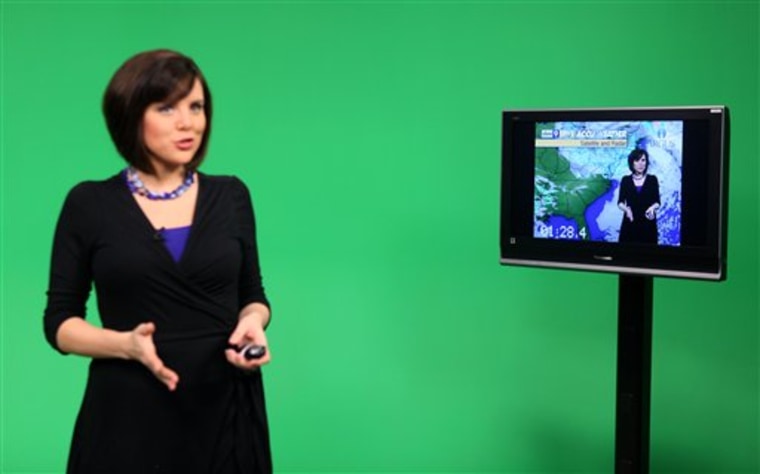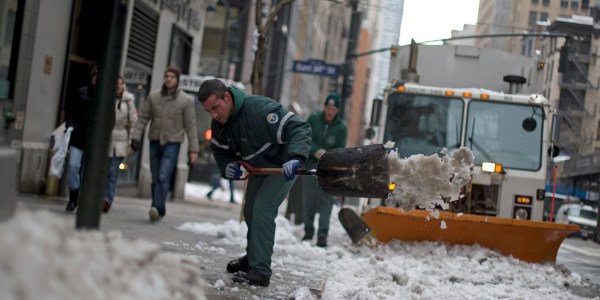The snowmenclature smackdown among meteorologists started with "snowmageddon" and "snowpocalypse." When the latest snow event — laden with flakes and whipped by heavy winds — headed for the storm-weary Northeast this week, the folks at AccuWeather Inc. warned of a coming "snowicane."
That did it for the more reserved National Weather Service, which accused the for-profit forecasters of overhyping to the point of inciting panic. The Weather Channel, an AccuWeather competitor, also took issue with the word.
As "snowicane" foreshadowed impending wind-and-snow doom Wednesday on AccuWeather's Web site, National Weather Service meteorologist Craig Evanego said the federal forecasters were taking a more measured approach, because the storm hadn't yet fully formed.
"It's almost inciting the public, inciting panic," Evanego said of AccuWeather's terminology.
His weather service colleague, meteorologist Roy Miller in Mount Holly, N.J., put it bluntly to The Morning Call newspaper in Allentown, Pa.
"It's not responsible to be putting out things like this," he said.
The newspaper called the brouhaha a "meteorologist smackdown."
Mixing science, entertainment
Richard Grumm, the government service's chief science and operations officer in State College, said science and "getting people's attention and entertainment" each serve a purpose.
"Scientifically, I have my own opinion of what a hurricane is," he added. "The word, 'snowicane' — I have a glossary of meteorology, it doesn't exist."
A key meteorological measure of a hurricane is sustained winds of at least 74 mph. As this week's storm barreled into New England, it slung wind gusts into that range and higher — but those winds were not sustained. It therefore failed to achieve hurricane status.
It did, however, dump even more snow on a region digging out from the deepest cumulative snows ever recorded for a winter season and knocked out power to more than 1 million homes and businesses. The number of outages was cut nearly in half by midday Saturday.
Slideshow 31 photos
Northeast snowstorm
Evan Myers, chief operations officer of AccuWeather, defended the choice of words but said his firm wasn't trying to panic anyone.
"I guess you can say that we stuck our necks out on this storm. ... Some people thought we were crazy, we were nuts, talking about the storm from this perspective," Myers said Friday from the floor of AccuWeather's high-tech operations center in State College.
"The storm performed as advertised," Myers said, noting, among other things, the coastal flooding from Maine to eastern Long Island and heavy snows in some areas.
Defending 'snowicane'
AccuWeather's Web site on Saturday took up the "snowicane" defense: "Our concern was that the storm might be taken too lightly by the public if we stuck to the norm of calling the system a nor'easter, snowstorm, or even a blizzard."
It cited wind gusts of 90-plus mph off the New England coast.
By another measure, barometric pressure, the storm lived up to its billing, AccuWeather said. The storm's central pressure was as low as a category 2 hurricane, the Web site reported.
"We said it would have the characteristics of a (hurricane or tropical system), and in fact, it did," Myers said.
Fred Carr, director of the University of Oklahoma School of Meteorology, hadn't been following the AccuWeather forecasts, but briefly reviewed one from early Thursday. AccuWeather's forecasts were consistent with the government's forecast models, he said. The difference was with the words used, not the forecast itself, he said.
"I'm sure no one seriously, even AccuWeather, (could) have seriously meant it to be like a hurricane," Carr said. "I think it was just a catchy term that would give them more publicity ... of course, now I'm playing psychologist."
‘Bad meteorology’
Though it didn't specifically name AccuWeather, The Weather Channel joined the fray. On its Web site, weather.com, it called invocation of the H-word an example of "bad meteorology."
"It's not an apt analogy to compare this winter storm, which is really all about cold air and jet stream, with a hurricane, which is all about heat and ... things of tropical origin," said Bruce Rose, vice president and principal scientist at The Weather Channel.
(NBC Universal is a part owner of The Weather Channel. Msnbc.com is joint venture of NBC Universal and Microsoft.)
Using a baseball analogy, Rose acknowledged the competitiveness among the meteorologists.
"When a guy gets a base hit, he's kidding around with the other team's first baseman," he said. "But they are still trying to beat each other's brains out when it comes to the final score."

